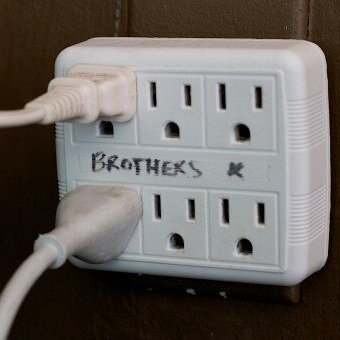TOP REASONS WHY YOU SHOULD NOT OVERLOAD YOUR ELECTRICAL OUTLETS
Let’s face it: modern life runs on electricity. From your smartphone that’s never more than an arm’s length away to the kitchen gadgets that promise to make you a five-star chef (but mostly make toast), our homes are packed to the rafters with devices that need power. As a result, it’s tempting to plug everything into the nearest outlet, add a power strip or two, and hope for the best. But before you turn your living room into a spaghetti junction of cords and blinking lights, let’s talk about why you should avoid overloading outlets- and what can happen if you don’t.
The Hidden Dangers Of Overloaded Outlets
Most people don’t give much thought to their electrical outlets. They’re just those little rectangles on the wall, right? But every outlet in your home is designed to manage a specific amount of electrical current. When you plug in more devices than the outlet is rated for, you create an overloaded outlet- a situation that’s far more dangerous than it sounds.
An overloaded electrical outlet can’t simply “work harder” to meet your demands. Instead, it overheats. If you’re lucky, your circuit breaker will trip, cutting off the power before anything catastrophic happens. But if your luck runs out or your home’s electrical system is outdated or faulty, the wires inside your walls can get so hot that their insulation melts. The result? A fire hazard that can put your family, your property, and even your neighbors at risk.
Why Overloaded Outlets Are More Common Than You Think
You might think overloaded sockets are only a problem in ancient, creaky houses with knob-and-tube wiring. But the truth is, electrical outlet overload is a hazard in homes of all ages. The problem has only gotten worse as our appetite for gadgets has grown. Think about it: fifty years ago, a typical living room might have had a lamp, a TV, or a radio. Today, you’ll likely find a TV, sound system, gaming consoles, streaming devices, chargers for every conceivable gadget, and maybe even a disco ball (hey, we’re not judging).
The temptation to plug everything into a single outlet, especially with the help of power strips and extension cords, is understandable. But every time you do, you’re inching closer to an overloaded power outlet and all the risks that come with it.
What Happens When You Overload An Outlet?
When you overload an electrical outlet, several things can go wrong, and none are good. Here’s a quick rundown of what happens when you push your outlets past their limits:
The Circuit Breaker Takes A Stand
Your home’s circuit breaker is like a bouncer at a club. It shuts everything down when things get too rowdy (i.e., when too much current flows through a circuit). A tripped breaker is annoying, but it’s actually doing you a favor by preventing more serious damage.
The Wires Start To Overheat
If the breaker doesn’t trip, or if you’re dealing with an older system without one, the wires inside your walls can get dangerously hot. Overheated wires can melt their insulation, leading to short circuits and electrical fires in the worst-case scenario.
Appliances Take The Hit
Overloaded outlets threaten your safety and can damage your beloved gadgets. Power surges or inconsistent voltage can fry sensitive electronics, turning your expensive devices into very fancy paperweights.
Power Outages And Flickering Lights
If you’ve ever noticed your lights dimming or flickering when you turn on a high-powered appliance, you’ve seen the effects of an overloaded circuit. In severe cases, you might even experience partial or total power outages in your home.
The Risk Of Electric Shock
Overloaded electrical sockets can also increase the risk of electric shock. If you notice a tingling sensation when you touch an outlet or switch, unplug everything and call a professional.
Warning Signs Of An Overloaded Outlet
Most electrical disasters don’t happen without warning. Your home will usually give you some clues that it’s struggling to keep up with your energy demands. Here are some telltale signs that you’re dealing with an overloaded outlet:
Circuit breakers that trip frequently, especially when you use certain appliances.
Lights that flicker, dim, or blink for no apparent reason.
Wall plates or outlets that are warm or discolored.
A burning odor from switches or outlets (never a good sign).
Appliances that don’t seem to be getting enough power or that shut off unexpectedly.
Mild shocks when you touch outlets, switches, or appliances.
If you notice any of these symptoms, don’t ignore them. They’re your home’s way of waving a red flag and begging for help.
The Real-Life Consequences Of Overloaded Outlets
You might think, “Sure, overloaded outlets sound bad, but how often does that cause a problem?” Unfortunately, the answer is “more often than you’d like.” Overloaded outlets are one of the leading causes of residential electrical fires, resulting in thousands of incidents and far too many injuries and deaths every year.
The risk goes up during certain times of the year, too. The holiday season is a prime example. All those twinkling lights, inflatable Santas, and extra kitchen gadgets seriously strain your home’s electrical system. It’s no coincidence that fire departments see a spike in electrical fires every December.
But it’s not just about fires. Overloaded outlets can also cause expensive damage to your home’s wiring, ruin your electronics, and leave you without power when you need it most. In short, it’s a problem that’s best avoided.
Why Not All Outlets Are Created Equal
It’s important to remember that not all outlets in your home are designed to handle the same load. Some circuits are rated for higher amperage and can safely power larger appliances, while others are intended for lighter use. Plugging a high-powered appliance, like a space heater or air conditioner, into a standard outlet can quickly lead to an overloaded electrical outlet and all the hazards that come with it.
A qualified electrician can help you understand your home’s circuit layout and load ratings. They can also diagnose any weak points in your system and recommend upgrades to keep your home safe.
How To Prevent Overloaded Outlets (Without Turning Your Home Into A Cave)
Now that you know the dangers, let’s discuss preventing overloaded outlets. The good news is, you don’t have to give up your favorite gadgets or live by candlelight. With a few smart strategies (and the help of a professional), you can keep your home powered up and safe.
Be Strategic About What You Plug In
Not all devices are created equal when it comes to power consumption. High-amp appliances like space heaters, hair dryers, and microwaves should always have their dedicated outlets. Avoid plugging multiple high-powered devices into the same outlet or power strip.
Limit The Use Of Extension Cords And Power Strips
Extension cords and power strips are handy, but not a permanent solution. Connecting too many devices to a single outlet is a recipe for an overloaded power outlet. If you rely on extension cords in certain rooms, it’s a sign that you need more outlets, not more cords.
Upgrade Your Electrical System
Older homes often don’t have enough outlets to meet modern needs. An electrician can add new outlets, upgrade your wiring, and install higher-capacity circuits where needed. It’s an investment in your home’s safety and peace of mind.
Know Your Circuit Breakers And Fuses
Every home has circuit breakers or fuses rated for a specific amperage. Make sure you know what those ratings are and don’t exceed them. If unsure, ask a professional to inspect your system and explain what’s safe.
Don’t Ignore Warning Signs
If you notice any of the symptoms of an overloaded outlet-tripped breakers, flickering lights, warm outlets, or strange smells, wait for the problem to get worse. Call an electrician promptly to diagnose and fix the issue.
Plan For The Holidays
If you love to go all out with holiday decorations, plan ahead. Spread your electrical load across multiple circuits, use LED lights (which draw less power), and avoid daisy-chaining multiple power strips together. Your home and your local fire department will thank you.
The Professional’s Perspective: Why DIY Isn’t The Answer
It’s tempting to think you can solve outlet overloads with a few quick fixes. But electricity is one area that pays to call in the pros. A licensed electrician has the training and experience to assess your home’s electrical system, identify potential hazards, and recommend solutions that will keep you safe for years.
Trying to DIY your way out of an overloaded outlet situation can lead to costly mistakes- or worse, serious injuries. When in doubt, call a professional. Your safety is worth it.
The Bottom Line: Safety First, Always
Overloaded outlets might seem minor, but the risks are genuine, and the consequences can be devastating. By understanding the dangers of overloaded electrical outlets, noting the warning signs, and taking proactive steps to prevent problems, you can protect your home, loved ones, and your favorite gadgets.
An ounce of prevention is worth a pound of cure. Don’t wait for a tripped breaker or a burning smell to remind you that your electrical system needs attention. If you’re concerned about overloaded sockets or want to upgrade your home’s wiring, contact a qualified electrician. They’ll help you keep the lights on, the gadgets humming, and your home safe, no matter how many devices you can’t live without.
So go ahead, enjoy your modern conveniences. Ensure you’re not asking your outlets to do more than they can handle. Your home (and your toaster) will thank you.
Get top-quality EV charging station installation, outlet and switch installation, Home lighting, and under-cabinet lighting for residential and commercial property owners. We use quality parts and materials and stand behind our workmanship.


